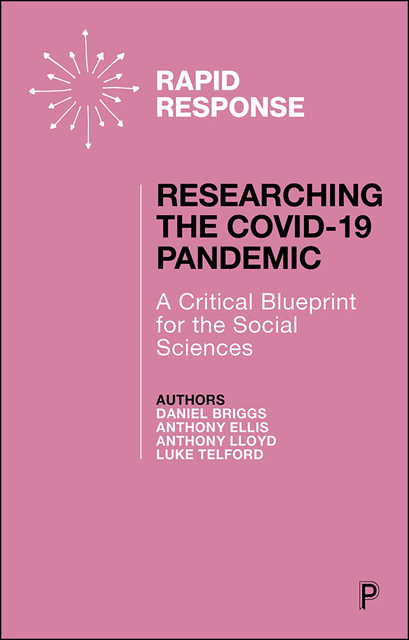Book contents
- Frontmatter
- Dedication
- Contents
- List of figures and tables
- Acknowledgements
- Foreword
- 1 Apocalypse then: The world pre-COVID-19 and the state of the social sciences
- 2 Viral Armageddon: The spread and impact of COVID-19
- 3 Apocalypse now: The (desk-based) scramble for knowledge
- 4 Studying the COVID-19 pandemic as it happens
- 5 Apocalyptic futures: An appeal to the social sciences
- Notes
- References
1 - Apocalypse then: The world pre-COVID-19 and the state of the social sciences
Published online by Cambridge University Press: 15 April 2023
- Frontmatter
- Dedication
- Contents
- List of figures and tables
- Acknowledgements
- Foreword
- 1 Apocalypse then: The world pre-COVID-19 and the state of the social sciences
- 2 Viral Armageddon: The spread and impact of COVID-19
- 3 Apocalypse now: The (desk-based) scramble for knowledge
- 4 Studying the COVID-19 pandemic as it happens
- 5 Apocalyptic futures: An appeal to the social sciences
- Notes
- References
Summary
In the final days of 2019, reports emerged from Wuhan in China that a new strain of coronavirus (SARS-CoV-2, or COVID-19) had been detected. Within weeks it became apparent that asymptomatic human-to-human transmission was possible and that a major pandemic could be about to unfold. According to the World Health Organization (2021), by late April 2021, over 150 million people worldwide had been infected with COVID-19 and over 3.1 million deaths had been attributed to the disease. In the intervening period, day-to-day life changed so dramatically for people around the world that it is hardly controversial to suggest that the COVID-19 pandemic represents the most significant event since the Second World War. While the extent and nature of nation states’ responses to the pandemic have varied, most societies have undertaken social distancing measures; adopted the use of face coverings; imposed national lockdowns; and forced businesses to close, which collectively have had a considerable impact upon social life.
Nation states have been required to intervene in their respective economies on a scale that is without precedent in recent history through the offering of loans, tax relief and furlough schemes to cover a proportion of workers’ salaries. At the onset of the pandemic, supply chains failed, in the UK there were accusations of government corruption in the procurement of essential services, while surveillance technologies, such as test and trace apps, have proliferated and expanded. Workers – who were able to do so – have had to shift to online working and with the closure of schools, colleges and university campuses, so have many children and young people, positioning domestic dwellings as the epicentre of work, familial and social life for many. Debates surrounding responses to COVID-19 have become increasingly polarised over the course of the pandemic: anti-lockdown protests have taken place in several states, while some politicians and scientists have highlighted the various dangers of some of the measures taken to reduce transmission. Indeed, societal responses to the pandemic have engendered a range of unintended harms, such as reported increases in domestic violence, child abuse, unemployment, heightened anxiety, mental health problems and suicide, and have meant other life-threatening diseases have gone undiagnosed and untreated.
- Type
- Chapter
- Information
- Researching the COVID-19 PandemicA Critical Blueprint for the Social Sciences, pp. 1 - 16Publisher: Bristol University PressFirst published in: 2023



